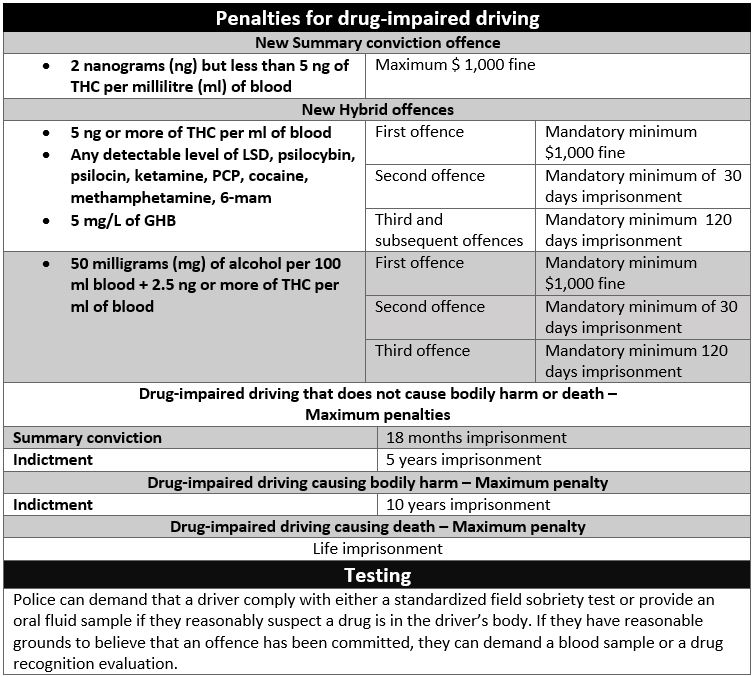The new impaired driving legislation came into force in June 2018. It introduces new offences and tougher penalties for drug-impaired driving. Most impaired driving offences are now considered serious crimes in Canada. You can even lose your permanent or temporary resident status due to cannabis-impaired driving.
The new tough cannabis-related penalties took effect on October 17, 2018 on those who drive while under the influence of marijuana or commit cannabis-related crimes.
On December 18, 2018, the impaired driving penalties will take effect.
Impaired driving is not limited to cars. Impaired driving also applies to all motor vehicles, including snowmobiles, all-terrain vehicles (ATV), boats, aircraft and railway equipment.
 New drug-impaired driving legislation:
New drug-impaired driving legislation:
- Creates new criminal offences of being at or over a prohibited blood drug concentration, including THC (the main psychoactive compound in cannabis) and cocaine within two hours of driving
- Authorizes the police to use approved drug screening equipment (e.g., oral fluid drug screeners) to detect the presence of drugs in drivers
- Strengthens the existing legal framework to enhance the investigation and prosecution procedures
 Drug-impaired driving offences
Drug-impaired driving offences
There are three new offences for having prohibited concentration of drugs in the blood within two hours of driving:
- for the summary conviction offence for 2 nanograms (ng) but less than 5ng of THC per millilitre (ml) of blood for the straight summary conviction offence
- for the hybrid offence for 5ng or more of THC per ml of blood for the drug-alone hybrid offence
- for the hybrid offence for a combination of 50 milligrams (mg) of alcohol per 100 ml blood + 2.5ng or more of THC per 1ml of blood for the drugs-with-alcohol hybrid offence
These offences apply for any detectable levels of other impairing drugs including cocaine, methamphetamine, LSD, 6-MAM (a metabolite of heroin), Ketamine, Phencyclidine, and Psilocybin and Psilocin (magic mushrooms).
 What are summary conviction offences and indictable offences?
What are summary conviction offences and indictable offences?
The main categories of criminal offences in Canada are summary conviction offences and indictable offences.
- A summary offence is a criminal act that can be proceeded with summarily, without the right to a jury trial and/or indictment (required for an indictable offence).
- An indictable offence is an offence which can only be tried on an indictment after a preliminary hearing to determine whether there is a prima facie case to answer or by a grand jury (in contrast to a summary offence). In trials for indictable offences, the accused normally has the right to a jury trial, unless he or she waives that right.
Penalties for drug-impaired driving
 Image credits: https://www.justice.gc.ca/eng/cj-jp/sidl-rlcfa/index.html
Image credits: https://www.justice.gc.ca/eng/cj-jp/sidl-rlcfa/index.html
There is a straight summary conviction offence and two hybrid offences, one hybrid offence applies to drugs alone, and one applies to drugs in combination with alcohol. A summary conviction offence is intended for less serious conduct. A hybrid offence is an offence where the prosecutor can decide, based on factors such as the seriousness of the harm caused, to proceed either by way of summary conviction (in less serious cases) or by indictment (in more serious cases).
- The penalty for the summary conviction offence is a maximum fine of $1,000.
- The penalties for the two hybrid offences are the same as for alcohol-impaired driving. These include mandatory minimum penalties of $1,000 fine for a first offence, 30 days imprisonment for a second offence and 120 days imprisonment for a third offence.
- The maximum penalty for most impaired driving offences will increase from 5 to 10 years.
Offences causing bodily harm:
- Offences causing bodily harm would become hybrid offences allowing the Crown to decide whether to proceed summarily where the injuries are less severe (for example, a broken arm). This will also help to address the issue of reducing court delays because summary conviction proceedings are simpler and take less time.
Maximum Penalties – dangerous driving:
- The maximum penalty for dangerous driving causing death would be increased to life imprisonment (up from 14 years). This is consistent with the maximum penalty for other transportation offences involving death.
The law also applies to those with medical authorization for cannabis.
 Police is authorized to do the following
Police is authorized to do the following
- Police can demand an oral fluid sample if the officer has a reasonable suspicion that the driver has drugs in their body based on objectively visible facts, such as red eyes, muscle tremors, agitation and speech patterns.
- Police may pursue drug recognition evaluation or take a blood sample if they have reasonable grounds to believe an offence has been committed.
- Police officers trained in drug recognition and evaluation (DRE) are able to provide opinion evidence in court as to whether or not a driver was impaired by a drug, without the need to qualify them as an expert witness in each trial
References:
- https://www.canada.ca/en/health-canada/news/2017/04/backgrounder_changestoimpaireddrivinglaws.html
- https://www.canada.ca/en/services/policing/police/community-safety-policing/impaired-driving/drug-impaired-driving.html
- https://www.canada.ca/en/immigration-refugees-citizenship/news/notices/impaired-driving-cannabis-penalties-affect-immigration-status.html
- https://canadianimmigrant.ca/immigrate/immigration-law/cannabis-act-stricter-driving-rules-can-impact-immigrants
- https://www.justice.gc.ca/eng/cj-jp/sidl-rlcfa/qa2-qr2.html
- http://www.rcmp-grc.gc.ca/ts-sr/aldr-id-cfa-aldr-eng.htm

















